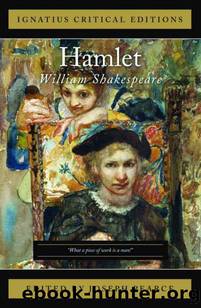Ignatius Critical Edtions: Hamlet by Shakespeare William

Author:Shakespeare, William [Shakespeare, William]
Language: eng
Format: epub
Tags: Spiritual & Religion
ISBN: 9781586172619
Publisher: Ignatius Press
Published: 2010-06-04T04:00:00+00:00
To Play or Not to Play:
How to Lie or Tell the Truth in Hamletâs Denmark
Anthony Esolen
Providence College
Claudius, that âking of shreds and patchesâ (3.4.103),1 a clever rhetorician who understands that one who would be a king had better be adept at playing the king before the audience of his court and nation, has been eyeing his nephew and now stepson, Hamlet. He is suspicious of the young manâs purported madness and has suborned the friends of Hamletâs youth to serve as spies, to discover what only he and perhaps his queen Gertrude must fear: that Hamlet knows of the murder of the old king his father. But at the same time, Hamlet himself has been eyeing the King, circling about him, and putting on an âantic dispositionâ (1.5.172) to mislead his pursuers.
Finally, Hamlet hits upon the trap he needs: he will discover the player king by means of a player king, and a player queen, and a play murder. He who lives by the stage will die by the stage, hoist with his own ropes. What interrogation and direct accusation could never have done, the indirection of art accomplishes in a moment. For at an apparently innocent entertainment staged to please the troubled Hamlet (a murder melodrama aptly called The Mousetrap), with all the court watching the prince, and with Hamlet and his friend Horatio watching the unwitting king, Claudius witnesses a reprise of his own crime. His conscience is seized. Before he can regain his stage presence, he interrupts the proceedings, calling for the last thing a murderer should desire: âGive me some light. Away!â (3.2.263).
The Kingâs shock comes not simply from Hamletâs having found him out. He is shocked also to have found himself out; for art enlists our sympathies before reason can sort through them or, more precisely, before the words we use to deceive ourselves can marshal their mendacious evidence. That appears by what the King does immediately after he bolts from the crowd. The man is no fool, nor is he plagued by indecision. He dispatches his spies, Rosencrantz and Guildenstern, to smuggle Hamlet off to England; then he consents that his foolish counselor Polonius should stow himself in the Queenâs chambers to eavesdrop upon her conversation with Hamletâthe Queen intends it to be an angry rebuke, but that overmatched actress is in for an unpleasant surprise. Yet once his audience is away and he remains alone on stage, Claudius can no longer sustain the pretense. For a few brief moments, the play is suspendedâI mean the play of corrupted Denmark, directed by the King. Suspended is the merciless need to keep up appearances, to praise the capable servant, to indulge the fool, to deceive the gullible, to weep the natural tears for a brother suddenly deceased, to win the acclaim of a restive people, to outface the young upstart Fortinbras of Norway, to carouse with no joy in the heart, even to pretend to a sister-wife that all has been done with due decorum
Download
This site does not store any files on its server. We only index and link to content provided by other sites. Please contact the content providers to delete copyright contents if any and email us, we'll remove relevant links or contents immediately.
| Books & Reading | Comparative Literature |
| Criticism & Theory | Genres & Styles |
| Movements & Periods | Reference |
| Regional & Cultural | Women Authors |
4 3 2 1: A Novel by Paul Auster(12393)
The handmaid's tale by Margaret Atwood(7767)
Giovanni's Room by James Baldwin(7346)
Asking the Right Questions: A Guide to Critical Thinking by M. Neil Browne & Stuart M. Keeley(5775)
Big Magic: Creative Living Beyond Fear by Elizabeth Gilbert(5774)
Ego Is the Enemy by Ryan Holiday(5450)
The Body: A Guide for Occupants by Bill Bryson(5098)
On Writing A Memoir of the Craft by Stephen King(4944)
Ken Follett - World without end by Ken Follett(4734)
Adulting by Kelly Williams Brown(4574)
Bluets by Maggie Nelson(4559)
Eat That Frog! by Brian Tracy(4540)
Guilty Pleasures by Laurell K Hamilton(4450)
The Poetry of Pablo Neruda by Pablo Neruda(4109)
Alive: The Story of the Andes Survivors by Piers Paul Read(4033)
White Noise - A Novel by Don DeLillo(4012)
Fingerprints of the Gods by Graham Hancock(4004)
The Book of Joy by Dalai Lama(3986)
The Bookshop by Penelope Fitzgerald(3854)
